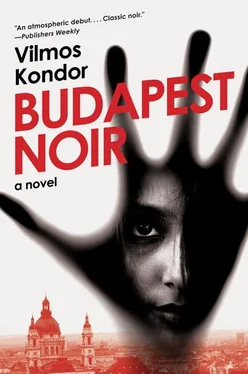“In case you’re interested, I know almost exactly what happened that night, because that’s how Pojva started off with me, too. Yes, ma’am”—Gordon nodded toward Mrs. Szőllősy—“your husband had Pojva sent after me, too, except that I lived through it. Your daughter didn’t. But Pojva didn’t set out to kill her, let’s make that clear. He wanted to give her a scare. He socked her in the pit of the stomach. I got through it because I knew what to expect. But Pojva caught your daughter by surprise: he made a fist right away and hit.” Gordon turned to Szőllősy. “Of course, you’re a clever man. I figure you didn’t tell your secretary who the girl was whom Pojva was supposed to beat up. As for Pojva, he didn’t have a guilty conscience. He doesn’t have a conscience to begin with, as far as I can tell, but that’s another story. Your daughter died, and Pojva took the money from her purse—almost two thousand pengős. He then went on his way without even looking back. When you found out what had happened to Fanny, you acted fast. You looked up Bárczy, right?” Szőllősy was silent. “Yes, that’s what I figure you did. But what did you tell him that made him call off the investigation? How the hell did he convince Vladimir Gellért not to look into the case?”
Szőllősy said not a word as he tapped the ashes off his cigar.
“Talk, you wretch!” shouted his wife, grabbing the telephone up off the floor. “Talk, goddamnit, or I’ll strangle you with this phone cord!”
Szőllősy cast her a scornful stare. “I told him there was a prostitute who blackmailed me. If I didn’t pay her, she’d proclaim our doings far and wide.”
“And you told him you’d taken care of this girl,” said Gordon, “but you weren’t so sure that the cops wouldn’t land on your trail in the course of the investigation. But that’s not enough in and of itself. Is it big news, after all, that men of your ilk buy pleasure with cash?”
“It’s not,” said Szőllősy. “Bárczy knew that, too. So did everyone. But I wanted him to take me seriously. I told him that the . . . hooker ”—he practically spit the word out—“didn’t blackmail me only with this, but with something else, too.”
“With what?”
“With me doing it with men,” Szőllősy replied indifferently.
“That you do what ?!” shrieked his wife.
“Of course I don’t do it.” Her husband looked at her with disdain. “But that would indeed have been enough to blackmail someone. I had to come up with a solid motive, one Bárczy would take seriously. Just because I had a hooker taken out wouldn’t have given him reason to do anything at all.”
“So you sold yourself to the undersecretary,” Gordon slowly said. “You figured it would be better to have Bárczy keep you in check with him thinking you’re a sodomite than for it to turn out that your daughter became a hooker serving the upper crust because she wanted to marry a Jew. You even took the risk of him setting István Cár’s men on you.”
“Who is that?” asked Mrs. Szőllősy.
“Cár is a detective with Unit V. Crimes against decency—that’s his beat. He goes hunting for Uranians.”
“I for one don’t know what ‘Uranians’ are,” said the woman.
“Slang for homosexuals,” Gordon replied. “He’s locked up more than one. In a word, then, you’ve taken on even this risk—that of being sent to a detention camp—so the truth about your daughter doesn’t come out.”
“You could put it that way.”
“Bárczy was more than happy to have Gellért put a halt to the investigation. With this information, which, moreover, you’d freely shared with him, for all practical purposes he could hold a loaded revolver to your head. All the time.”
Mrs. Szőllősy raised her eyes to her husband. “You are a . . .”
“Go ahead,” said Szőllősy, “finish your sentence.”
The woman did not answer. She stared straight ahead. The telephone fell from her hand.
Gordon nodded. “Bárczy got word to Kozma, and Kozma passed along the instructions to Gellért. It’s clear. That’s what they were talking about at Gömbös’s wake.”
“What?” asked the woman.
Looking at Gordon as if his wife was not there, Szőllősy explained, “And on the same occasion, Gellért told Kozma that you were snooping around.”
“And that’s how this information made its way back to you,” said Gordon. “That’s why you set Pojva on me.”
“I had to somehow warn you to keep your distance from the affair,” replied Szőllősy, ever more caught up in the telling of the story, as if proud of what he’d done.
“And yet you couldn’t have a journalist killed, after all.”
“Don’t be so sure about that.”
“I’m not. But I didn’t let what did happen get the better of me.”
“No.”
“That’s why you set Gellért on me, too, right? When I left the Sztambul Coffeehouse. You had him sent there.”
The man nodded.
“But there you miscalculated,” said Gordon, locking his eyes on Szőllősy. “Fundamentally. The chief inspector didn’t scare me off, you see. Indeed, he’s the one who set me on the right path. Had it not been for Gellért, I don’t think I would be here today.”
“You’re completely right about that,” said Mrs. Szőllősy out of the blue. Both men looked up with a start. The woman collected herself, adjusted her hair, and straightened her back. The whites of her eyes were red, her face was moist from tears, and her voice was hoarse. “It’s not a private detective I hired,” she went on. “For I know Vladimir well. To be more precise, a long time ago we knew each other well. I’ve often seen his name in the papers”—she now looked at Gordon—“more than once in your articles. I didn’t know who to turn to. I couldn’t trust a private detective; such characters are unreliable. That’s when I thought of Vladimir. At the end of September I called on him at his office. I told him in person that Fanny had disappeared. Nothing more. As for why, I didn’t tell him a word.” She looked at her husband. “Don’t you worry, I didn’t blurt out your dirty little secrets.”
“Mine?” Szőllősy erupted. “As if this whole affair was my doing.”
“You can discuss that later, András,” said the woman, throwing back her head. Her husband moved to speak but then decided otherwise.
“What happened in his office?” asked Gordon.
“I gave him a picture of Fanny. I met with him on October 3, a Saturday, in City Park. That’s when he showed me that . . .” She fell silent. “ . . . that other picture. He promised me he’d save Fanny from that . . . life, if that can be called a life at all.”
“You haven’t heard from him since then?” asked Gordon.
“No,” replied the woman. “I was in fact worried about what might have happened. That’s when you showed up wanting to ask questions about our daughter. After you left, I telephoned Vladimir right away, but I couldn’t reach him. I figured all the fuss involving the funeral was taking up his time. I was planning to go to his office tomorrow, but . . .”
All at once Szőllősy stood up tall and straight, stretching out haughtily as he rose.
“What do you propose to do now?” he asked, looking at Gordon.
“I don’t know,” said Gordon with a shrug. “Not that I have much left to do,” he added, picking up his notes. “I now know all the missing pieces to the story.”
“Surely you had some aim in coming here,” said Szőllősy. “You want money? How much?”
“It’s not so simple.”
“So you want a lot. Out with it—how much?”
“It’s not about money.”
“You can’t publish this, anyway, in case you’re thinking of writing about it. I can still keep them from running it. You might even lose your job. I can still arrange for that much.”
Читать дальше
Конец ознакомительного отрывка
Купить книгу












